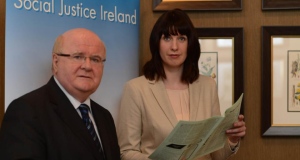
By Ann Marie Foley - 07 January, 2014
 The poorest 10% of society must not be excluded from any social dialogue process that Government develops, Social Justice Ireland has stated.
The poorest 10% of society must not be excluded from any social dialogue process that Government develops, Social Justice Ireland has stated.
“The Government needs to engage all sectors of society, not just trade unions and employers, in addressing the huge challenges Ireland currently faces,” SJI said in a statement on Monday.
“Excluding some stakeholders will simply lead to further inequality and social exclusion,” SJI warned and added that a process of social dialogue is a key mechanism in maximising the resources for shaping Ireland’s future.
A report in November by SJI showed that the poorest 10% of the population lost the highest percent of real disposable income since the onset of the financial crisis in 2008.
Both the Society of St Vincent de Paul (SVP) and Social justice Ireland (SJI) have called for a vision for Ireland which incorporates social equality for all citizens.
Social Justice Ireland (SJI) in its statement “2014 – time to end short-termism”, wrote that the future offered (by the Irish Government) is deeply unjust and does not constitute real recovery. Human dignity and the common good are not guiding policy decision-making.
“We also believe that the pathways being followed by Government seek to protect the rich at the expense of the rest of us. It is not acceptable that the major sacrifices in building the future should be borne by those on low to middle incomes or by future generations,” stated SJI.
In an interview on Spirit Radio, Tom Mac Sweeney, National Vice-President, SVP said that there are worrying indications that inter-generational poverty may be occurring as a result of the impact of austerity on families.
He expressed concerns that families which had improved their situation are being pushed back into difficulties.
While Government statements about the economy and possible tax cuts are very welcome, he said, the reality is that families will have less money as property tax and water charges and some social welfare changes hit home.
Tom Mac Sweeney said the SVP would like the Government, political parties, trade unions and employer organisations to join with it in debating what type of Ireland is needed in the future to provide social equality for all citizens.
“The Society would like to see a living wage for everyone as a core of social justice in the future. Every citizen is entitled to a decent standard of living,” he said.
Social Justice Ireland stated that policy-making in Ireland has tended to focus almost exclusively on the ‘urgent’ in recent years which may be understandable because of the serious financial crisis. But there has been no broader framework, or strategic thinking and planning, nor a guiding vision.
“Social Justice Ireland fully acknowledges Ireland’s difficult fiscal position. We also accept that Ireland must pay its way. However, we believe strongly that there are alternatives to the present approach which would protect the vulnerable while rescuing the economy and doing this in a sustainable manner,” the body stated.
It added that economic and social development are two sides of the one reality. Economic development provides resources for social development, however there can be no lasting economic development without the provision of social services and infrastructure. For example a good education system is vital for the development of a ‘hi-tech, hi-spec, smart’ economy.
“It is time to put a stop to short-termism. We must ask ourselves as a society where we are right now and, more importantly, where we want to be in the future. Many government initiatives have been deeply flawed,” stated SJI.
The justice group vowed that in 2014 it will continue to spell out detailed policy proposals.